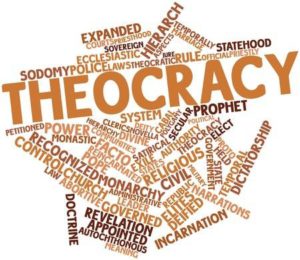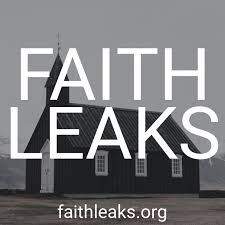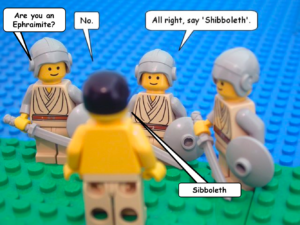 ‘I’m afraid you have a resident nasty.’ I was sitting in an Oxford vicarage and these shattering words were addressed to me.
‘I’m afraid you have a resident nasty.’ I was sitting in an Oxford vicarage and these shattering words were addressed to me.
I had been to see Mrs. Vicar a couple of weeks before for counselling about the sexual abuse that had been inflicted on me as a child, and she had prayed for emotional healing. This was a follow-up appointment, and she was concerned that I showed no improvement. Worse, I was beginning to feel angry about the abuse. In her mind the equation was simple: I hadn’t responded to prayer, but had actually got worse; therefore I was hosting one or more evil spirits. Unfortunately, she said, she wasn’t in a position to do anything about it that day. She explained that she never tackled ‘deliverance’ ministry on her own, and her husband was away leading a series of missions. She would make another appointment for me when he got back.
I went home feeling even worse about myself than before – and now frightened, too. There was something evil within me that this experienced woman of God was afraid to tackle. How was I to cope with that knowledge? How was I safe to be with my own self? I was desperate for Mr. Vicar to return so I could be free of the fear and self-loathing induced by the thought of having a ‘demon’.
Mr. Vicar came back, and I heard nothing about another appointment. Weeks went by as my emotional and psychological state grew worse. I became so desperate that there seemed no alternative but to kill myself. One afternoon I was thinking how best to do it when the phone rang. It was a friend calling for a chat. That call – an unlikely one given it was long distance and at the expensive rate – saved me. She convinced me I needed to phone the Vicars straight away, tell them how I was, and insist on an early appointment.
A few days later I was again in the vicarage’s rather gloomy sitting room. Mr and Mrs Vicar were both there, as arranged. With them was a second local vicar, who I was told would be observing. I remember nothing of what followed, except feeling uncomfortable and very vulnerable. Certainly I felt no great improvement as a result of it. The experience occurred in the 1980s, but I still vividly remember how damaging it was.
To many readers this whole episode will seem strange and absurd. But Mr. and Mrs. Vicar were both intelligent and highly educated, and genuinely believed they were helping me. Mr. Vicar went on to lecture at a theological college, and helped to train Anglican ordinands, no doubt in a similar approach to the one he and his wife used with me.
For those from the Charismatic wing of the Church – not just the Church of England but all churches – belief in demons is not only real, but very much part of the way they live out their faith. For many years I was part of this scene myself. I took a short course in deliverance ministry at Ellel Grange (then in its very early days), and was a curate at a large charismatic church. Ellel taught that the experience of being abused was in itself an opportunity for demons to enter. According to Ellel there were many such ‘entry points’, ranging from having a Masonic ancestor to having touched a dead body. What did that mean for nurses and undertakers, I wondered?
The church where I was curate both taught and practiced John Wimber’s methods of ‘power healing’. This, too, often involved ‘deliverance from evil spirits’. I hadn’t encountered Wimber’s teachings before, and my questioning attitude did not make me popular in some quarters. I was not alone in my doubts, however; two doctors in the congregation (one a neurologist) told me that Wimber’s healing technique was medically classed as hypnotism. In other words, it was the power of suggestion rather than the Holy Spirit which was at work. I started on a quest to understand the interplay between the spiritual, emotional, and psychological aspects of human personality – a quest on which I’m still engaged.
My concern in this blog is not with the thinking behind demonology and deliverance ministry, but with its effect on those who are exposed to it. I was advised by a colleague’s wife that Body Shop products were ‘demonic’, because they were often sourced from the developing world where ‘pagan’ religions predominate. The same woman expressed anxiety that there was a gap in our round-the clock prayer chain just as children were coming out of school. This worried her because she felt that God wouldn’t protect them unless someone was specifically praying for their protection at the time. A friend was told by an Ellel staffer that a paisley scarf was ‘demonic’. Those who see demons everywhere in this way live fearful lives, and become limited in many ways. Imagine having to consult an ‘expert’ regarding perfectly ordinary everyday purchases, in order to avoid becoming subject to demonic activity! Imagine worrying that your loved ones are only ‘protected’ if someone prays the right prayers, and at the right time!
The belief in the prevalence and influence of evil spirits seems to have gained predominance among those who practice inner healing and ‘prayer ministry’. John Wimber’s Vineyard network of churches has grown. Ellel Ministries have expanded in the 30 years since I first encountered them. Other schools of healing that heavily emphasise deliverance ministry have been developed, such as Sozo and Elijah House. All of these have practitioners who operate within churches of the main denominations; in retreat houses, conferences and other centres. Some mainline denominational churches are listed as Sozo ‘resource churches’.
There are serious concerns with this approach to healing ministry. It can leave the subject feeling vulnerable and worse about themselves than before, as happened to me. Emotions and responses which are not only natural but healthy, such as anger at being betrayed and abused, are labelled as demonic and disowned. This constitutes a barrier to genuine healing, since being able to feel the anger is a key part of the survivor’s journey to recovery. ‘Difficult’ aspects of the personality – what is often called the ‘shadow side’ – are split off and disowned rather than faced and owned. This is not the path to integration and wholeness. It is certainly not the way to spiritual and psychological wellbeing. And deliverance ministry involves a power imbalance between the person being prayed for and those doing the praying, which is intimidating.
I came to recognise that deliverance ministry, and methods of inner healing which involve it, is often a form of spiritual abuse. It is time the churches woke up to this, and began to discourage its practice.







